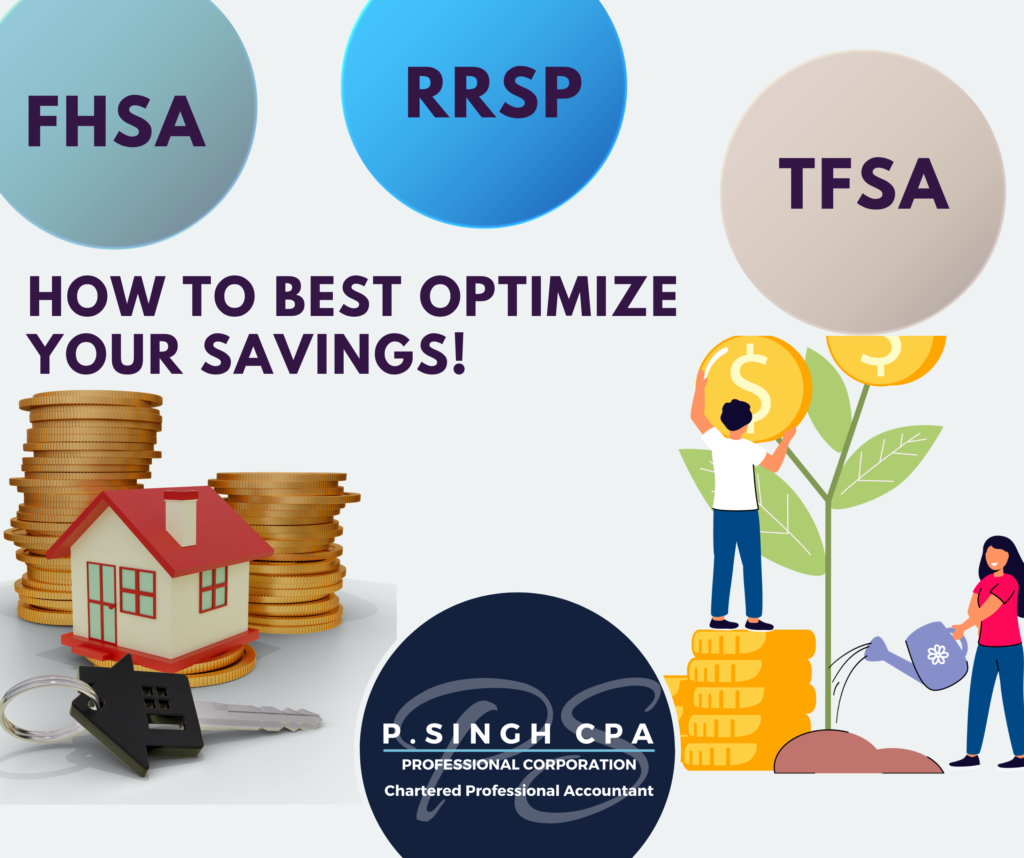Wondering if a TFSA, RRSP or FHSA may be right for you? Discover how each of these accounts can help you reach your goals—and remember, you don’t have to pick just one!
We provide a summary overview help you understand the basics of each of these three available savings plans. It is important to assess your situation and carefully plan the timing of when to contribute/withdraw money from these plans.
| Feature | TFSA (Tax-Free Savings Account) | RRSP (Registered Retirement Savings Plan) | FHSA (First Home Savings Account) |
| What is it? | A registered plan where your investment earnings and withdrawals are tax-free | A registered plan where your contributions are tax-deductible (up to your personal deduction limit) and investment earnings are tax-deferred (you are charged taxes when you withdraw funds) | A new registered plan designed to help first time homebuyers. Your contributions are tax-deductible and investment earnings and withdrawals are tax-free if used to purchase your first home |
| What is it typically used to save for? | Shorter term goals (new bike, vacation, home reno, etc.) or longer term (retirement or home ownership) | Retirement | Your first home |
| Who can open one? | Canadian residents with a Social Insurance Number (SIN) who are at least 18 or 19 (age of majority in your province) | Canadian residents with a Social Insurance Number (SIN) who are under age 71, have earned income and file a tax return in Canada | Canadian residents with a Social Insurance Number (SIN) who are at least age 18 (and no less than the age of majority in your province) and under age 71, and you and/or your spouse or common-law partner have not owned a home where you lived in the current calendar year or at any time in the preceding four calendar years |
| Can the plan be opened jointly? | No—a TFSA is an individual plan | No—an RRSP is an individual plan, but you can contribute to a spousal RRSP | No—an FHSA is an individual plan |
| TAX TREATMENT | |||
| Are contributions tax-deductible? | No | Yes (up to your personal deduction limit) | Yes (up to the annual and lifetime limits) |
| Do my savings grow tax-free or tax-deferred? | Tax-free | Tax-deferred (added to taxable income the year you take the money out; a withholding tax will also apply to early withdrawals) | Tax-free as long as you use funds for a qualifying first home |
| CONTRIBUTING MONEY | |||
| How much can I contribute each year? | $6,500 for 2023 plus your unused contribution room and any amounts you’ve withdrawn from previous years | 18% of previous year’s earned income, less any pension adjustment, up to maximum annual limit ($30,780 for 2023) | $8,000 annually, plus up to $8,000 of your unused contribution room, up to a maximum lifetime limit of $40,000 |
| Is there an over-contribution penalty tax? | Yes, 1% per month on excess contributions | Yes, 1% per month on excess contributions (if you exceed your deduction limit by $2,000) | Yes, 1% per month on excess contributions |
| Can I carry forward unused contribution room? | Yes, indefinitely | Yes, until December 31 of the year you turn 71 | Yes, unused contribution room can be carried over to the next year, up to a maximum of $8,000 |
| Do I have to earn income to get contribution room? | No | Yes | No |
| Can I contribute after age 71? | Yes | No, you must convert to a RRIF or purchase an annuity, or close the plan by December 31 of the year you turn 71. | No, the funds in your FHSA must be used by the 15th anniversary of opening the FHSA or December 31 of the year you turn 71, whichever comes earlier. |
| You can convert your plan to a RRIF or annuity to receive a steady stream of income, or make a taxable withdrawal for the full balance of your plan. | If you have not used your funds by that time, they can be transferred (tax-free) to your RRSP without impacting your RRSP contribution room, or to your RRIF. Otherwise, your withdrawal will be taxable. | ||
| WITHDRAWING MONEY | |||
| Can I take my money out for any reason? | Yes, although timing depends on what investments you hold in your TFSA. | Yes, but taxes are withheld at the time of withdrawal (unless participating in the Home Buyers’ Plan or Lifelong Learning Plan) | Yes, although timing depends on what investments you hold in your FHSA. |
| If you use the funds for anything other than a qualifying first home, your withdrawal will be taxable. | |||
| If I withdraw money, do I get my contribution room back? | Yes, withdrawal amounts are added to contribution room the following year | No, withdrawals have no bearing on your deduction limit or contribution room. | No |
| Home Buyer Plan withdrawals need to be contributed back over 15 years. | |||
| Do withdrawals affect government benefits? | No | Possibly, yes—withdrawals increase your income, which could impact government benefits like Old Age Security (OAS) payments | It depends on type of withdrawal: |
| Withdrawals used to purchase a qualifying home will not affect government benefits | |||
| Non-qualifying withdrawals increase your income, which could impact government benefits like Old Age Security (OAS) payments | |||
We at PSingh CPA Professional Corporation can help you understand what plan makes the most sense for you and recommend the most beneficial option for your situation. We provide full course bookkeeping, accounting and tax advisory services to small businesses and individual clients. Contact us today to book an appointment and we’d be happy to help.
Sources:
https://www.canada.ca/en/revenue-agency/services/tax/individuals/topics/first-home-savings-account.html
https://www.rbcroyalbank.com/investments/tfsa-vs-rrsp-fhsa.html
https://www.taxtips.ca/fhsa/first-home-savings-account.htm#:~:text=If%20at%20any%20time%20your,any%20time%20in%20the%20month.



